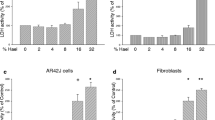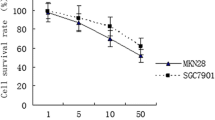Abstract
Most solid tumors, including gastric cancers, respond poorly to non-surgical treatments which are expected to induce an apoptosis-dependent involution. We hypothesize that the apoptotic machinery in solid tumors is either defective or in a suppressed condition. Overcoming the ineffective induction of apoptosis may improve the responsiveness of solid tumors to non-surgical treatments. Recently, sorbitol, a kind of hexose, has been found to be an effective inducer of apoptosis in HEp-2 cells. Therefore, it is of particular interest to examine the effect of sorbitol-treatment on gastric cancer cells. In the present study, we selected 4 gastric cancer cell lines which have been reported to exhibit different abilities in regard to apoptosis induction, and examined the effect of sorbitol-treatment on apoptosis induction. Within 3 hr after sorbitol-treatment, apoptosis was induced comparably in all cell lines examined. Cell death in MKN-1, MKN-28 or MKN-74 proceeded in a biphasic manner, while cell death in KATO-III was monophasic. The cell death partially depended on caspase activity. Treatments with sorbitol in combination with 12-O-tetradecanoylphorbol-13-acetate (TPA) markedly suppressed the apoptotic cell death, suggesting a role of protein kinase-C-dependent process. To our knowledge, this is the most rapid induction of apoptosis in human gastric cancer cells reported to date.
Similar content being viewed by others
References
Green DR, Reed JC. Mitochondria and apoptosis. Science 1998; 281: 1309–1312.
Thornberry NA, Lazebnik Y. Caspases: Enemies within. Science 1998; 281: 1312–1316.
Cory S. Cell death throes. Proc Natl Acad Sci USA 1998; 95: 2077–12079.
Kerr JFR, Winterford CM, Harmon BV. Apoptosis. Its significance in cancer and cancer therapy. Cancer 1994; 73: 2013–2026.
Zhang Y, Fujita N, Tsuruo T. Caspase-mediated cleavage of p21 Waf1/Cip1 converts cancer cells from growth arrest to undergoing apoptosis. Oncogene 1999; 18: 1131–1138.
Hueber A, Winter S, Weller M. Chemotherapy primes malignant glioma cells for CD95 ligand-induced apoptosis up-stream of caspase 3 activation. Eur J Pharmacol 1998; 352: 111–115.
Koyama H, Miwa Y. Suppression of apoptotic DNA fragmentation in herpes simplex virus type 1–infected cells. J Virol 1997; 71: 2567–2571.
Hojo H. Establishment of cultured cell lines of human stomach cancer origin and their morphological characteristics. Niigata Igaku Zasshi 1977; 9: 281–285.
Owen-Schaub LB, Radinsky R, Kruzel E, Berr K, Yonehara S. Anti-Fas antibody on nonhematopoietic tumors: Levels of Fas/APO-1 and bcl-2 are not predictive of biological responsiveness. Cancer Res 1994; 54: 1580–1586.
Sekiguchi M, Sakakibara K, Fujii G. Establishment of cultured cell lines derived from a human gastric carcinoma. Jpn J Exp Med 1978; 48: 38–61.
Hayashi Tatebe S, Osaki M, Goto A, Suzuki Y, Ito H. Expression of Fas antigen and its mediation of apoptosis in human gastric cancer cell lines. Jpn J Cancer Res 1997; 88: 49–55.
Osaki M, Tanabe S, Goto A, Hayashi H, Oshimura M, Ito H. 5–Fluorouracil (5–FU) induced apoptosis in gastric cancer cell lines: Role of the p53 gene. Apoptosis 1997; 2: 221–226.
Mosmann T. Rapid colorimetric assay for cellular growth and survival: Application to proliferation and cytotoxicity assays. J Immunol Methods 1983; 65: 55–63.
Izawa M, Kato Y, Iwasaki K. Induction of a receptor-mediated genomic DNA fragmentation in rat thymus following administration of glucocorticoids with different biopotencies: An approach by a cell-free system. Endocr J 1997; 44: 677–686.
Wyllie AH. Glucocorticoid-induced thymocyte apoptosis is associated with endogenous endonuclease activation. Nature 1980; 284: 555–556.
Susin SA, Lorenzo HK, Zamzami N, et al. Molecular characterization of mitochondrial apoptosis-inducing factor. Nature 1999; 397: 441–446.
Susin SA, Lorenzo HK, Zamzami N, et al. Mitochondrial release of caspase-2 and-9 during the apoptotic process. J Exp Med 1999; 189: 381–394.
Izawa M, Mori T, Satoh T, Teramachi K, Sairenji T. Identification of an alternative form of caspase-9 in human gastric cancer cell lines; a role of a caspase-9 variant in apoptosis-resistance. Apoptosis 1999; 4: 321–325.
Zhang J, Liu X, Scherer DC, Kaer LV, Wang X, Xu M. Resistance to DNA fragmentation and chromatin condensation in mice lacking the DNA fragmentation factor 45. Proc Natl Acad Sci USA 1998; 95: 12480–12485.
Sahara S, Aoto M, Eguchi Y, Imamoto N, Yoneda Y, Tsujimoto Y. Acinus is a caspase-3–activated protein required for apoptotic chromatin condensation. Nature 1999; 401: 168–173.
Jarvis WA., Turner AJ, Povirk LF, Trayor RS, Grant S. Induction of apoptotic DNA fragmentation and cell death in HL-60 human promyelocytic leukemia cells by pharmacological inhibition of protein kinase C. Cancer Res 1994; 54: 1707–1714.
Masuda Y, Yoda M, Ohizumi H, et al. Activation of Protein kinase C prevents induction of apoptosis by geranylgeraniol in human leukemia HL60 cells. Int J Cancer 1997; 71: 691–697.
Author information
Authors and Affiliations
Rights and permissions
About this article
Cite this article
Teramachi, K., Izawa, M. Rapid induction of apoptosis in human gastric cancer cell lines by sorbitol. Apoptosis 5, 181–187 (2000). https://doi.org/10.1023/A:1009697016510
Issue Date:
DOI: https://doi.org/10.1023/A:1009697016510




